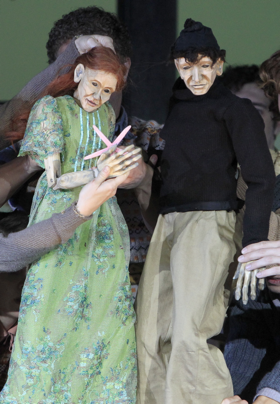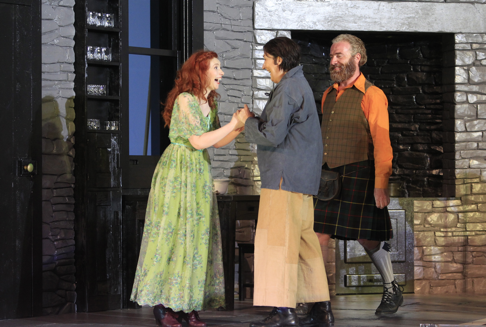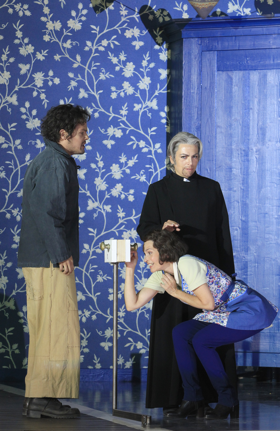
07 Jul 2014
Ariodante at the Aix Festival
High drama in Aix. Three scenarios in conflict — those of G.F. Handel, Richard Jones and the intermittents (disgruntled seasonal theatrical employees). Make that four — mother nature.
English Touring Opera are delighted to announce a season of lyric monodramas to tour nationally from October to December. The season features music for solo singer and piano by Argento, Britten, Tippett and Shostakovich with a bold and inventive approach to making opera during social distancing.
This tenth of ten Live from London concerts was in fact a recorded live performance from California. It was no less enjoyable for that, and it was also uplifting to learn that this wasn’t in fact the ‘last’ LfL event that we will be able to enjoy, courtesy of VOCES8 and their fellow vocal ensembles (more below …).
Ever since Wigmore Hall announced their superb series of autumn concerts, all streamed live and available free of charge, I’d been looking forward to this song recital by Ian Bostridge and Imogen Cooper.
Although Stile Antico’s programme article for their Live from London recital introduced their selection from the many treasures of the English Renaissance in the context of the theological debates and upheavals of the Tudor and Elizabethan years, their performance was more evocative of private chamber music than of public liturgy.
Evidently, face masks don’t stifle appreciative “Bravo!”s. And, reducing audience numbers doesn’t lower the volume of such acclamations. For, the audience at Wigmore Hall gave soprano Elizabeth Llewellyn and pianist Simon Lepper a greatly deserved warm reception and hearty response following this lunchtime recital of late-Romantic song.
For this week’s Live from London vocal recital we moved from the home of VOCES8, St Anne and St Agnes in the City of London, to Kings Place, where The Sixteen - who have been associate artists at the venue for some time - presented a programme of music and words bound together by the theme of ‘reflection’.
'Such is your divine Disposation that both you excellently understand, and royally entertaine the Exercise of Musicke.’
‘And there was war in heaven: Michael and his angels fought against the dragon; and the dragon fought and his angels, And prevailed not; neither was their place found any more in heaven … that old serpent … Satan, which deceiveth the whole world: he was cast out into the earth, and his angels were cast out with him.’
There was never any doubt that the fifth of the twelve Met Stars Live in Concert broadcasts was going to be a palpably intense and vivid event, as well as a musically stunning and theatrically enervating experience.
‘Love’ was the theme for this Live from London performance by Apollo5. Given the complexity and diversity of that human emotion, and Apollo5’s reputation for versatility and diverse repertoire, ranging from Renaissance choral music to jazz, from contemporary classical works to popular song, it was no surprise that their programme spanned 500 years and several musical styles.
The Academy of St Martin in the Fields have titled their autumn series of eight concerts - which are taking place at 5pm and 7.30pm on two Saturdays each month at their home venue in Trafalgar Square, and being filmed for streaming the following Thursday - ‘re:connect’.
The London Symphony Orchestra opened their Autumn 2020 season with a homage to Oliver Knussen, who died at the age of 66 in July 2018. The programme traced a national musical lineage through the twentieth century, from Britten to Knussen, on to Mark-Anthony Turnage, and entwining the LSO and Rattle too.
With the Live from London digital vocal festival entering the second half of the series, the festival’s host, VOCES8, returned to their home at St Annes and St Agnes in the City of London to present a sequence of ‘Choral Dances’ - vocal music inspired by dance, embracing diverse genres from the Renaissance madrigal to swing jazz.
Just a few unison string wriggles from the opening of Mozart’s overture to Le nozze di Figaro are enough to make any opera-lover perch on the edge of their seat, in excited anticipation of the drama in music to come, so there could be no other curtain-raiser for this Gala Concert at the Royal Opera House, the latest instalment from ‘their House’ to ‘our houses’.
"Before the ending of the day, creator of all things, we pray that, with your accustomed mercy, you may watch over us."
The doors at The Metropolitan Opera will not open to live audiences until 2021 at the earliest, and the likelihood of normal operatic life resuming in cities around the world looks but a distant dream at present. But, while we may not be invited from our homes into the opera house for some time yet, with its free daily screenings of past productions and its pay-per-view Met Stars Live in Concert series, the Met continues to bring opera into our homes.
Music-making at this year’s Grange Festival Opera may have fallen silent in June and July, but the country house and extensive grounds of The Grange provided an ideal setting for a weekend of twelve specially conceived ‘promenade’ performances encompassing music and dance.
There’s a “slide of harmony” and “all the bones leave your body at that moment and you collapse to the floor, it’s so extraordinary.”
“Music for a while, shall all your cares beguile.”
The hum of bees rising from myriad scented blooms; gentle strains of birdsong; the cheerful chatter of picnickers beside a still lake; decorous thwacks of leather on willow; song and music floating through the warm evening air.

High drama in Aix. Three scenarios in conflict — those of G.F. Handel, Richard Jones and the intermittents (disgruntled seasonal theatrical employees). Make that four — mother nature.
All for Lodovico Ariosto’s brief histoire of Ginevra and Ariodant in his send-up of chivalry in his epic farce Orlando Furioso. By the time this little story got to opera it had lost the famous indulgent smile Ariosto cast on knights and damsels and now needed about twenty-five arias to resolve a truly complicated mess.
This production by British director Richard Jones was created just now in Aix, the start of its travels to Amsterdam, Toronto and Chicago — the Aix Festival has an incessant belief that co-productions are economical.
Somehow Ariosto and Handel and the American Midwest made Mr. Jones think of American Gothic painter Grant Wood’s “Dinner for Threshers” (or maybe it was Ultz’s idea, his mono-named designer). The set was an exact copy. We would not have known where Handel’s opera takes place had not Ariosto’s King of Scotland worn a kilt. But Richard Jones’ American threshers of the Wood painting were on the stage much of the evening keeping the action firmly in the western hemisphere, a presence that did not endear them to the exasperated audience (there was whistling when these valiant participants took their 2 AM bows).
 Patricia Petibon as Ginevra, Sarah Connelly as Ariodante, Luca Tittoli as Il Re di Scozia
Patricia Petibon as Ginevra, Sarah Connelly as Ariodante, Luca Tittoli as Il Re di Scozia
Mr. Jones determined that Ariosto’s poetic immolation of fallen damsels might be poetically well represented by implying the brutally restrictive mores he imagines imposed by American gothic principles. It is an amusing premise, probably more amusing to Europeans than to Americans like me who think that Europeans should mind their own moral business.
Handel’s Ariodante is different than most Handel operas because it includes dance interludes (Handel inserted them to be able to include the participation of a famous dancer and her company at the Covent Garden 1735 premiere). Since Ginevra is believed to be a fallen woman these interludes made Mr. Jones think of burlesque pole dancing (an art form born in Canada during the Great Depression by the way) that he was able to include by turning Ginevra, at least as imagined by American threshers, into a puppet who was stripped of her chaste garments, then scantily clad in black vinyl and red spike heels and made to masturbate abstractly on a rake handle.
But Mr. Jones did not exclude dancing after all, as he had his American threshers shed their shoes and line them up across the front of the stage in the old death ovens image and happily do a country dance to the arias that announced the “they-lived-happily-ever-after” resolution (The king of Scotland was spared from burning his daughter who married her intended, Ariodante, after all).
Mr. Jones’ real Ginevra however bought none of this. She packed her suitcase, slipped out of her bedroom, walked onto the stage apron and when last seen was hitching a ride, presumably to Toronto or Chicago.
Maybe there was Ariosto’s famous smile after all. The audience indulged Mr. Jones with rapt attention in the second and third acts (it was hard to concentrate in the first act — read on), and rewarded him with thunderous boos (huées in French), meaning that we had had a very good time and loved every minute and that we did not know what to think. Mr. Jones’ wide smile never left his face.
Where was Handel in all this, you may ask. Well, he was right there and having a very good time too, though none of this was what he had in mind.
The esteemed Freiburger Barockorchester is in residence in Aix for this 66th Festival d’Aix with its period brass and wind instruments, and its gut strings making its uniquely cultured sound that placed Handel’s score in another time and another place. Just when you might have thought that it does not really matter what orchestra is in the pit for a Handel opera an aria would come along that was infinitely enriched the with colors that could emanate only out of this superb orchestra.
Handel surely could have only rejoiced to the matched cast of excellent singers brought to Aix for the occasion. French soprano Patricia Petibon overshadowed all others in an over-the-top performance as Ginevra, able to float beautiful high, straight (vibrato-less) tones and to cut loose in full voiced lyricism. As Mr. Jones’ Ginevra she introduced a pathos to her Act II lament (she believes Ariodante is dead) that went beyond brilliant Baroque singing to arrive, almost, at whispered tones. In total her very clear voice melted into a beautifully defined and determined character — it was a complete performance.
 David Portillo as Lucanio, Sandrine Piau as Dalinda, Sonia Prina as Polinesso
David Portillo as Lucanio, Sandrine Piau as Dalinda, Sonia Prina as Polinesso
No less striking was the Polinesso of Italian contralto Sonia Prina as Handel’s vindictive Duke and as Mr. Jones’ morally corrupt fundamentalist preacher who stood over Grant Wood’s harvest table during the overture to deliver the blessing (an understandably exasperated audience member shouted “oh sit down”). Mme. Prina sang with color and assurance as if she were a famed castrato, her staccato fioratura genuinely astonishing, her brilliant wig (a long gray, troublesome lock on either side fell onto her face, plus a long, sexually ambivalent braid) made us detest her even more.
The balance of the cast gave high-wire vocal acts as well. Dalinda (Ginevra’s maid) as sung by French harpist turned soprano Sandrine Piau was not Handel’s confused soubrette but a full-scaled vocal villain who raged magnificently at love and not because Polinesso had raped her (on stage) but because he did not love her. Ariodante’s brother Lucanio was sung by American tenor David Portillo who was the junior member of the cast, and even so managed to hold his own and render his inexperience and youth as Lucanio’s innocence and naiveté. Italian bass Luca Tittoco straddled the poles of an isolated, old fashioned farmer who should have felt a bit silly in a kilt while he had to be a mythical personage from the age of chivalry at the same time.
Ariodante, British mezzo-soprano Sarah Connelly, brought an encompassing warmth to Handel’s hero, having suffered setbacks worthy of Ariosto’s erstwhile knight on her way to the stage, escorted from her dressing room to the stage by police who protected her from the intermittents who had broken into the backstage of the theater, knocked over a stagehand and blocked her way (first act). Later (second act) she waited to deliver her exquisitely chiseled lament (Polinesso had deceived Ariodante into believing that Ginevra was unfaithful) while a screaming car alarm was located and removed from the auditorium.
Italian early music conductor Andrea Marcon [sic] presided, evidently unflappable, over the evening, not stopping when the intermittents began a barrage of noise just outside the open air theater during the first act. Though later he coolly halted his pit musicians and the stage when security measures needed to be undertaken, started again as if nothing had happened. Thankfully in Act III (1:30 AM) he did not stop when lightning, thunder and raindrops competed with Handel and Richard Jones for our attention. The wind whipped costumes of the singers must have created some consternation among those on the stage who surely were, like us, praying for the end to come.
And yes, finally, the twelve valiant threshers from English Voices, the excellent chorus, took off their shoes and danced one last time. We booed gleefully and went back to our hotels.
Michael Milenski
Casts and production information:
Ariodante: Sarah Connolly; Ginevra: Patricia Petibon; Dalinda: Sandrine Piau; Polinesso: Sonia Prina; Lurcanio: David Portillo; Il Re di Scozia: Luca Tittoto; Odoardo: Christopher Diffey. English Voices (chorus) and the Freiburger Barockorchester. Conductor: Andrea Marcon. Mise en scène: Richard Jones; Décors et costumes: Ultz; Lumière: Mimi Jordan Sherin; Chorégraphe: Lucy Burge; Metteur en scène et concepteur des marionnettes
Finn Caldwell. Théâtre de l’Archvêché, Aix-en-Provence, July 3, 2014.